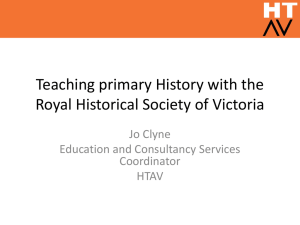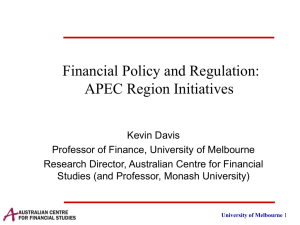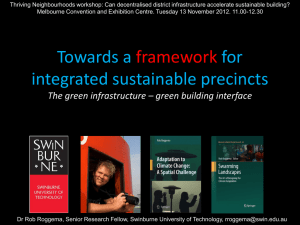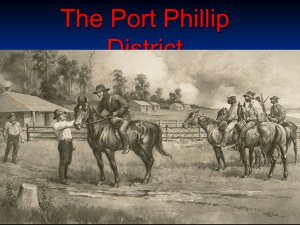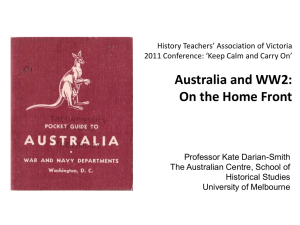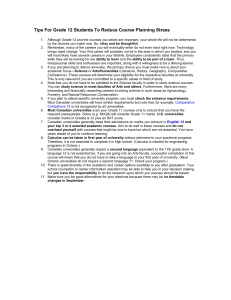Graduation address
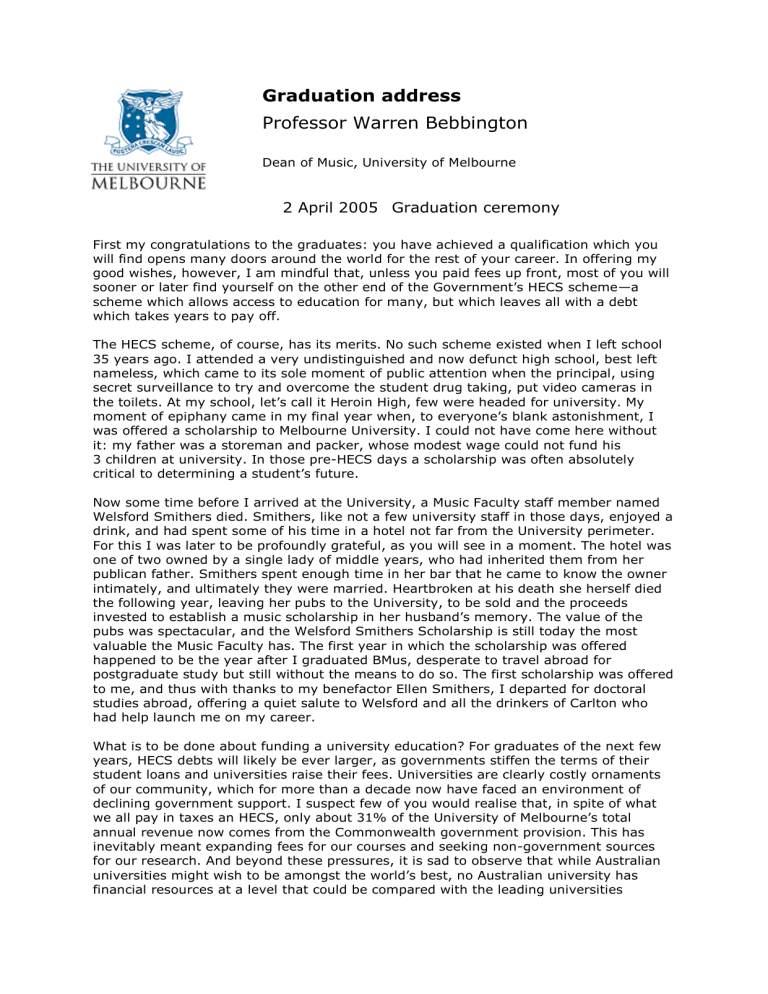
Graduation address
Professor Warren Bebbington
Dean of Music, University of Melbourne
2 April 2005 Graduation ceremony
First my congratulations to the graduates: you have achieved a qualification which you will find opens many doors around the world for the rest of your career. In offering my good wishes, however, I am mindful that, unless you paid fees up front, most of you will sooner or later find yourself on the other end of the Government’s HECS scheme—a scheme which allows access to education for many, but which leaves all with a debt which takes years to pay off.
The HECS scheme, of course, has its merits. No such scheme existed when I left school
35 years ago. I attended a very undistinguished and now defunct high school, best left nameless, which came to its sole moment of public attention when the principal, using secret surveillance to try and overcome the student drug taking, put video cameras in the toilets. At my school, let’s call it Heroin High, few were headed for university. My moment of epiphany came in my final year when, to everyone’s blank astonishment, I was offered a scholarship to Melbourne University. I could not have come here without it: my father was a storeman and packer, whose modest wage could not fund his
3 children at university. In those pre-HECS days a scholarship was often absolutely critical to determining a student’s future.
Now some time before I arrived at the University, a Music Faculty staff member named
Welsford Smithers died. Smithers, like not a few university staff in those days, enjoyed a drink, and had spent some of his time in a hotel not far from the University perimeter.
For this I was later to be profoundly grateful, as you will see in a moment. The hotel was one of two owned by a single lady of middle years, who had inherited them from her publican father. Smithers spent enough time in her bar that he came to know the owner intimately, and ultimately they were married. Heartbroken at his death she herself died the following year, leaving her pubs to the University, to be sold and the proceeds invested to establish a music scholarship in her husband’s memory. The value of the pubs was spectacular, and the Welsford Smithers Scholarship is still today the most valuable the Music Faculty has. The first year in which the scholarship was offered happened to be the year after I graduated BMus, desperate to travel abroad for postgraduate study but still without the means to do so. The first scholarship was offered to me, and thus with thanks to my benefactor Ellen Smithers, I departed for doctoral studies abroad, offering a quiet salute to Welsford and all the drinkers of Carlton who had help launch me on my career.
What is to be done about funding a university education? For graduates of the next few years, HECS debts will likely be ever larger, as governments stiffen the terms of their student loans and universities raise their fees. Universities are clearly costly ornaments of our community, which for more than a decade now have faced an environment of declining government support. I suspect few of you would realise that, in spite of what we all pay in taxes an HECS, only about 31% of the University of Melbourne’s total annual revenue now comes from the Commonwealth government provision. This has inevitably meant expanding fees for our courses and seeking non-government sources for our research. And beyond these pressures, it is sad to observe that while Australian universities might wish to be amongst the world’s best, no Australian university has financial resources at a level that could be compared with the leading universities
Professor Warren Bebbington Graduation address abroad: at Melbourne we have the budget approximately the size of Stanford
University’s but six times as many students: in other words, our students are one-sixth as well resourced as those at Stanford.
While I would not pretend that the size of a university’s budget is a principal measure of its quality, excellent funding is nevertheless a companion sine qua non of high prestige for a university. At Melbourne we have been taking steps to close the gap between the resources we have and what a leading university needs: our declared ambition has been to achieve by 2020 a resource base which compares with universities of front international rank. But aside from hoping for a larger government handout or relying on spiralling fees, there is another way we might enlarge our resource base and ease the burden on students. The Higher Education division of Standard and Poor’s looks to a toprated university as one firmly seated on a financial stool with four legs—government funds, student fees and research grants make only three; the fourth leg is the one which provided for me as a student, but which we have scarcely glanced at in Australia: endowment income.
Unquestionably, the University of Melbourne has not been deprived of benefactors like
Ellen Smithers over its history: our endowment totals some $200 million, amongst the largest of any Australian university; yet is it enough to be a significant help? It represents a paltry investment of about $5,000 per student, way below the level of any front-rank University abroad. To be sure, it is unfair to compare the tiny purse of a public University like Melbourne with the fabulous treasure chests of private universities like Harvard, Princeton or Yale; but of the 10 best endowed universities in the USA one third are public universities, and even with those we also compare poorly—on a per student basis we have less than a quarter of the endowment of the University of
California system. And less than a tenth of the endowment per student of University of
Texas system. Texans may not like to hear that the area of their great state would fit neatly in NSW, or that the natural resources are fewer than WA’s, but they can justly crow about their public university, which through their generosity has an endowment of
US$10 billion, 50 times larger than ours.
In terms of its annual investment return, our endowment is very well managed. Despite difficult market conditions in recent years its performance has been impressive; but again in per capita terms it yields about $400 per student per year. Such an amount is unlikely to ease the HECS debt of any student in a significant way. And in any case this income is not available on such a basis: most of our endowment income is tied to prizes and narrow, specific purposes.
What then is to be done, so that the University’s rising costs do not increasingly fall on student shoulders? At Melbourne through our new Access Melbourne scholarship scheme, we are now admitting 200 students a year from disadvantaged backgrounds who will be entirely HECS exempt. This is the most generous such scheme in Australia, but even so reaches only 3% of our most needy students. In the music faculty, we have addressed the problem through a faculty endowment campaign, in which we are seeking gifts to fully endow one quarter of all places in the Faculty: so that 25% of our students in the future will pay no fees and will leave the campus with no HECS or other debt whatsoever. We are well on our way with this campaign, with one-third of the funds now raised. My proposition is that such a campaign might be seen as a model for the campus at large.
Running the music campaign has not been particularly thorny. I find that potential donors in the community regard the University as a great cultural and intellectual treasure with which they are pleased to be associated. Our university is unquestionably the richest cultural centre in any Australian seat of learning. Our art collection is the largest outside the NGV, our theatrical ventures include the MTC, our publications include Meanjin, one of the national’s leading literary magazines, and each year we offer
University of Melbourne www.unimelb.edu.au/speeches/ Page 2 of 4
Professor Warren Bebbington Graduation address the community innumerable concerts, exhibitions, lectures and events, as well as sponsorship for cultural activities from regional activities like the SheppARTon Festival to the annual concerts in the Myer Music Bowl. Moreover, the University takes its responsibility to serve community welfare very seriously. It has been a major donor to the current tsunami appeal. All in all, we have supported the community generously.
Yet the University has been reluctant to ask our community to support us. Even our own alumni we seldom ask for money. Our view has been that, if our programs are valued, donations and endowments will follow. Thus in 2003 the celebration of the University’s
150th anniversary was seen, not as an opportunity for the community to give to us, but as another opportunity for us to give to them. The very theme of the Anniversary was
“Giving to Students and the Community.” Books were produced and given away, exhibitions and musical ensembles toured the region offering free concerts, and numerous alumni were invited back to the campus to attend events, most mounted at university expense. Indubitably, the University of Melbourne has not wanted to appear as a mendicant, on bended knee with hand outstretched.
Nevertheless, benefactors have appeared, even without our asking: over $16 million in new gifts flowed into the University last year. But is this an appropriate outcome for a
University of our standing? Most universities of our size abroad would have a comprehensive development program, with a structured annual giving agenda, a multiyear campaign, and a planned giving office. Many would see $100 million a year as a not unreasonable target; in the USA SUNY has just announced their campaign to seek
US$3 billion over the next 7 years. For some universities it is $5 billion.
To be sure, Melbourne’s bashfulness in asking for money is not unique: one recent survey found that 25% of all university graduates had never been asked to make a gift to their alma mater. Yet there is no need to think that Australians are ungenerous.
Statistics show that 66% of Australian households donate to charitable causes, giving on average $445 a year. 4.4 million of the population volunteers for charitable tasks each year. Much has been written about the coming social burden the aging baby boom generation will bring to our nation, the massive rise in medical and aged care that will occur as this population retires and withers away. Yet it has been estimated that the same generation will also inherit massively from their parents, some $600 billion by
2021. Some of this will go to charitable purposes, on one estimate as much as $5 billion to education and research. Indisputably, the climate for philanthropy has never been more promising.
Our reticence towards giving has been as great with foundations as it is with individuals.
Yet in USA as much goes to universities from philanthropic foundations as from individuals. Philanthropy Australia has found that Aust trusts and foundations disperse
$150 million of their funds to education and research each year. Improving and expanding our relationship with philanthropic bodies would be another key part in any comprehensive development program.
There are many who discourage fundraising as not a productive path for universities. We are told that tax incentives for educational giving are inadequate in Australia, that economic conditions have not been favourable, and that those with bad memories of their student days or who did poorly in their own education would not be likely to give to a university. Yet development research shows that tax incentives tend to affect only a relatively narrow segment of high income earners, that economic conditions affect business sponsorship but not too much individuals drafting a will, while how a donor’s own education went tends not to be a factor in giving to universities: on the contrary, there are notable instances where donors with poor or even no university education are the first to want to see their name on a building or an endowed professorial chair.
University of Melbourne www.unimelb.edu.au/speeches/ Page 3 of 4
Professor Warren Bebbington Graduation address
Now, do not imagine that the purpose of this speech is to signal that you will not escape the hall without passing a collection tin, or to warn you that the privileges of being a
Melbourne alumnus means receiving an avalanche of begging letters. On the contrary, approaches to our alumni for gifts have been rare, as I have said. In my faculty’s campaign, the great majority of our new benefactors have not been found among our former students. My proposal is simple. Endowed scholarships were critical to my own passage through university; and in a national environment where students are increasingly burdened with education debts, where the level of government oversight of universities seems to increase in inverse proportion to the level of government assistance provided, it is time for universities to invite community participation in the same way hospitals and welfare agencies, museums and performing arts companies do: through a direct approach. Support of universities is no longer largely dependent on taxation, it cannot be made largely dependent on student fees. Support of any worthy cause is the right of a citizen to act voluntarily, it exemplifies freedom of choice and is a manifestation of the community’s collective action.
The University of Melbourne can be proud of its support of the community; I believe the community would be proud to support our students. But a serious and successful
University development program will require sustained effort and genuine institutional commitment. Development studies show its success does not depend on the history, size or wealth of the institution; but on how well those responsible know their own institution and match their campaign to its character. Our new Vice Chancellor has recently announced that the development agenda will now be actively pursued at Melbourne, led by a DVC Innovation and Development. This is timely indeed. As globalization makes the role and importance of local community ever greater, and as our aging population approaches the greatest intergenerational transfer of wealth in our history, there has never been a better time to develop and enhance community confidence in the philanthropic traditions of voluntary giving and action in support of the students of a great public institution.
University of Melbourne www.unimelb.edu.au/speeches/ Page 4 of 4
